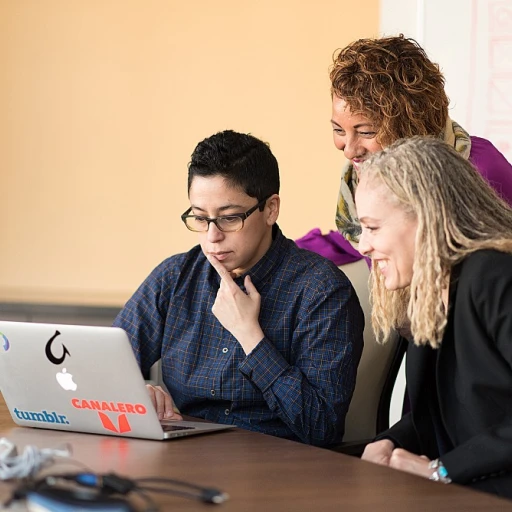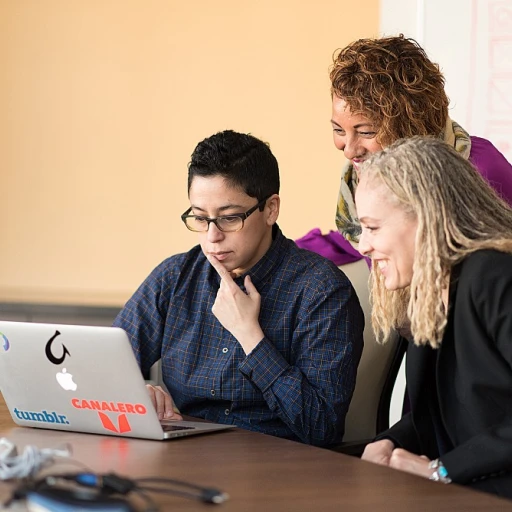
Understanding the Coaching Relationship
The Foundation of a Coaching Bond
In the realm of lifelong learning, building a coaching relationship that fosters growth and development is paramount. At its core, a coaching relationship is a unique partnership between coach and client. This bond is designed to cultivate personal and professional growth through an ongoing process of discovery and action. One might wonder why this relationship is different from others, like the traditional manager-employee dynamic. The answer lies in the nature of the interaction; it is a collaborative path where both coach and coachee embark on a journey of exploration and challenge. Through powerful questions and active listening, the coach helps unlock the coachee's potential by harnessing their innate capabilities. The essence of a successful coaching relationship hinges not only on the exchange of skills or knowledge but also on mutual respect and understanding. It's about how a person engages with their clients and how effectively they create a supportive environment. For any coaching relationship to thrive, it must rest on a sturdy foundation of trust and open communication, where both parties feel heard and empowered. Trust is the linchpin that holds the coaching process together. When a client trusts their coach, they are more likely to engage deeply in the process, feel comfortable sharing vulnerabilities, and be open to constructive feedback. Building trust is not a one-time achievement but a continuous effort throughout the relationship. Understanding the roles and expectations within the coaching process enhances the effectiveness of this dynamic. It's crucial that both coach and client are clear on what they seek to achieve and how they plan to get there. As a relationship coach, establishing these elements can lead to more profound relationships and successful outcomes. In this intricate dance of questioning and answering, of leading and co-creating, the coaching relationship becomes a transformative experience. It molds individuals to not only set ambitious goals but also to navigate through their journey with resilience and insight. For those seeking to delve further into understanding these dynamics and incorporate truth-seeking into their coaching approach, exploring resources that delve into the interplay of trust and personality can be invaluable. Consider exploring how truth-seeking factors into personality within your own coaching endeavors to elevate your leadership development initiatives.The Role of Trust and Communication
Fostering Trust and Communication in Coaching
Building a successful coaching relationship hinges on trust and effective communication. As a coach, fostering an environment where clients feel comfortable exploring their development is crucial. Trust isn't built overnight; it requires time and consistent effort throughout the coaching process. To establish a strong foundation, coaches need to engage in active listening. This involves genuinely understanding the client's needs and concerns during coaching sessions. By paying close attention and showing empathy, coaches demonstrate their commitment to the coachee's growth. The use of powerful questions is another vital component in enhancing trust. Thoughtful questioning encourages deeper reflection and can reveal insights that drive meaningful change. Questions like, "What challenges you the most in achieving your goals?" or "How do you envision success in this aspect of your life?" help clients articulate their thoughts and intentions, forming a deeper connection between the client and coach. Effective communication isn't just about speaking and listening; it's about clarity and transparency. Coaches should establish clear expectations around goals and the coaching process itself. By doing this, clients know what to expect, which reduces uncertainty and helps build trust. Moreover, an understanding of diverse communication styles is essential. Each person communicates and processes information uniquely. Tailoring communication approaches to the individual helps maintain a supportive atmosphere where clients feel valued and understood. For further insights into these dynamics, you can explore mastering applied project management for lifelong learning, which delves into tools that enhance communication and process management in coaching. Ultimately, an emphasis on trust and communication nurtures a robust bond between the coach and client, leading to impactful personal and professional development.Setting Goals and Expectations
Establishing Clear Pathways for Growth
The essence of a successful coaching relationship lies in the clarity and mutual understanding of goals and expectations. For a fruitful collaboration, it is critical that both the coach and the client invest in a transparent process of setting objectives. A discussion on goals allows both parties to develop a shared vision of what they aim to achieve through their coaching sessions.
In the initial phases, engaging in active listening is vital to identify the client's aspirations and challenges. This not only helps in building trust but also sets the stage for a productive coaching process. Coaches should utilize powerful questions to unlock deeper insights into the client's motivations and obstacles. The questions should be well thought out, allowing the client to reflect and articulate their needs effectively.
Aligning on expectations provides a framework within which the coaching will operate. This minimizes misunderstandings and creates a baseline for measuring progress. When a client and coach clearly understand the parameters of their relationship, it ensures a smoother journey towards leadership development and personal growth.
Moreover, setting expectations involves acknowledging the uniqueness of each client's journey. A coach should adapt their methods to suit the client's learning style to foster an environment conducive to growth. By doing so, coaches ensure that clients feel heard and understood, enhancing the overall effectiveness of the coaching relationship.
It is equally important to revisit these agreed-upon goals and expectations periodically. This ensures that both parties remain aligned and modifications can be made as the development progresses. Over time, the flexibility to adapt these goals based on the client's evolving needs will reinforce the relationship and support sustained growth.
For those interested in deeper insights on how to navigate corporate education, you can learn more by reading an informative article that explores this topic further.
Adapting to Individual Learning Styles
Tailoring Coaching to Individual Needs
In the realm of effective coaching, recognizing and adapting to individual learning styles is crucial. Each client brings a unique set of preferences and experiences to the coaching relationship, and understanding these nuances can significantly enhance the coaching process. Coaches who are adept at identifying and adjusting to these differences can foster a more productive and supportive environment for their clients.
Active listening is a vital skill in this context. By truly listening to the client, a coach can discern subtle cues about their preferred learning style. Some clients may thrive on detailed discussions and powerful questions, while others might prefer a more hands-on approach. The key is to remain flexible and responsive, allowing the coaching sessions to evolve in a way that best supports the client's growth and development.
Strategies for Adapting to Learning Styles
- Visual Learners: Use diagrams, charts, and visual aids to help clients grasp complex concepts. Encourage them to visualize their goals and the steps needed to achieve them.
- Auditory Learners: Engage in discussions and encourage clients to verbalize their thoughts. This can help reinforce their understanding and commitment to the coaching process.
- Kinesthetic Learners: Incorporate activities and real-world applications into the coaching sessions. This approach can make the learning experience more tangible and impactful.
By tailoring the coaching approach to the individual, coaches can build stronger relationships with their clients. This personalized attention not only enhances the client's experience but also builds trust, a cornerstone of any successful coaching relationship. As clients feel more understood and supported, they are more likely to engage deeply with the coaching process, leading to more meaningful outcomes.
Overcoming Challenges in Coaching Relationships
Navigating Obstacles in the Coaching Journey
In the journey of fostering effective coaching relationships, challenges are inevitable. Coaches and clients often encounter hurdles that need strategic handling to ensure the relationship remains productive and beneficial. Recognizing these potential difficulties and addressing them proactively can greatly enhance the coaching process. One common challenge is the alignment of goals and expectations between the coach and the client. Misalignment can lead to frustration, with clients feeling their needs are not being met, while coaches may struggle to focus their efforts effectively. To mitigate this, it's essential to engage in clear, open communication from the outset. Engaging in active listening and asking powerful questions can help both parties establish a shared vision, facilitating a smoother journey toward development. Trust is another fundamental pillar that, if compromised, can hinder progress. Building trust is a time-intensive endeavor but crucial for a successful coaching relationship. Both parties need to engage honestly and respectfully, fostering a safe space where the client feels valued and heard. This sense of trust creates an environment conducive to open dialogue and deep personal growth. Adapting to individual learning styles is also essential to overcoming challenges within the coaching partnership. Each person, whether coach or coachee, has a unique learning curve. By tailoring the approach and techniques used in coaching sessions to the client's individual style, coaches can enhance the effectiveness of their efforts and encourage more meaningful engagement from the client. Finally, time management can often prove challenging in maintaining momentum within coaching relationships. It is crucial for the client and the coach to accord priority and dedication to their sessions, viewing them as integral to the client's developmental journey. Establishing a regular schedule can help maintain consistency, allowing for incremental progress and a sustained focus on growth. Integrating these strategies into the coaching relationship allows for a more resilient, dynamic partnership. As challenges arise, they are more easily navigated, paving the way for continuous learning and development, benefiting both clients and coaches alike.Measuring Success in Coaching
Evaluating the Impact and Achievements in Coaching
To ensure the effectiveness of a coaching relationship, measuring success is paramount. Both the coach and client need to assess the progress made towards the set goals to determine the efficacy of the coaching process. Here are some ways to evaluate:- Review Clients' Goal Achievement: One of the primary indicators of success in a coaching relationship is goal attainment. By revisiting the set objectives discussed initially, coaches can evaluate if the client’s goals have been achieved. This step highlights the client's level of development and growth over the coaching journey.
- Gauge Client Satisfaction: Successful coaching involves ensuring clients feel their expectations have been met. Collecting feedback on their experience can provide valuable insights into the relationship’s strengths and areas for improvement. Active listening to the client's feedback can help in building trust and enhancing the coaching strategy.
- Reflect on Behavioral Changes: Evaluating any positive behavioral changes in the client can be a sign of effective coaching. Coaches should monitor and document these changes as a way to track the coachee’s growth and adaptation to new skills or mindsets introduced during sessions.
- Adaptability and Innovation in Coaching Methods: As discussed earlier regarding individual learning styles, an effective relationship coach will tailor their approach. Assessing how adaptable the coaching techniques have been can serve as a benchmark for success.
- Ongoing Development and Leadership Growth: For long-term coaching relationships, tracking leadership development and new skills acquired can demonstrate the ongoing impact of coaching. This doesn’t always follow a linear path but rather reflects continuous learning and adaptation over time.













